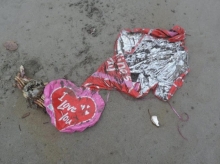
By: Nir Barnea, Pacific Northwest Regional Coordinator, and Emma Tonge, Intern, with the NOAA Marine Debris Program
Many thanks go out to Russ Lewis, Heidi Pedersen, and Dana Wu for the balloon reports.
I was on a phone interview with Glenn Farley, a reporter with King 5 TV in Seattle who was preparing a report on balloons that become marine debris, when he asked, “So, how many balloons have been found along the Washington coast?” Unfortunately, I didn’t have an answer for him. “I find balloons occasionally during marine debris cleanups, and I know that others do too, but I don’t have a number for you,” I told him. Obviously, this was one of those situations where “I’ll get back to you later” was in order.
His question made me curious, and I wanted to have a better idea of the scale of this problem. How many balloons? What type? How do we get this information? It was clear that a full scale, scientific study on the number of balloons arriving on the Washington coast would take much time and effort. But, could we possibly get current anecdotal information to give us an idea of how many balloons are found?